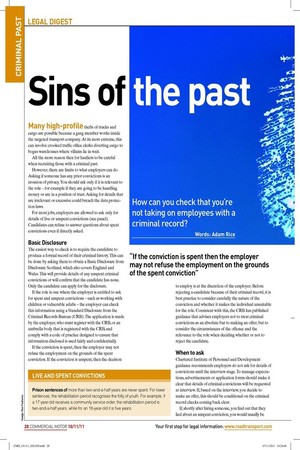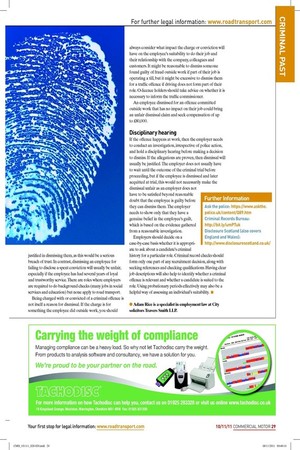Sins of the past
Page 21

Page 22

If you've noticed an error in this article please click here to report it so we can fix it.
Many high-profile thefts of trucks and cargo are possible because a gang member works inside the targeted transport company. At its most extreme, this can involve crooked trafic ofice clerks diverting cargo to bogus warehouses where villains lie in wait.
All the more reason then for hauliers to be careful when recruiting those with a criminal past.
However, there are limits to what employers can do. Asking if someone has any prior convictions is an invasion of privacy. You should ask only if it is relevant to the role – for example if they are going to be handling money or are in a position of trust. Asking for details that are irrelevant or excessive could breach the data protection laws.
For most jobs, employers are allowed to ask only for details of live or unspent convictions (see panel). Candidates can refuse to answer questions about spent convictions even if directly asked.
Basic Disclosure
The easiest way to check is to require the candidate to produce a formal record of their criminal history. This can be done by asking them to obtain a Basic Disclosure from Disclosure Scotland, which also covers England and Wales. This will provide details of any unspent criminal convictions or will conirm that the candidate has none. Only the candidate can apply for the disclosure.
If the role is one where the employer is entitled to ask for spent and unspent convictions – such as working with children or vulnerable adults – the employer can check this information using a Standard Disclosure from the Criminal Records Bureau (CRB). The application is made by the employer, who must register with the CRB, or an umbrella body that is registered with the CRB, and comply with a code of practice designed to ensure that information disclosed is used fairly and conidentially.
If the conviction is spent, then the employer may not refuse the employment on the grounds of the spent conviction. If the conviction is unspent, then the decision to employ is at the discretion of the employer. Before rejecting a candidate because of their criminal record, it is best practice to consider carefully the nature of the conviction and whether it makes the individual unsuitable for the role. Consistent with this, the CRB has published guidance that advises employers not to treat criminal convictions as an absolute bar to making an offer, but to consider the circumstances of the offence and the relevance to the role when deciding whether or not to reject the candidate.
When to ask
Chartered Institute of Personnel and Development guidance recommends employers do not ask for details of convictions until the interview stage. To manage expectations, advertisements or application forms should make it clear that details of criminal convictions will be requested at interview. If, based on the interview, you decide to make an offer, this should be conditional on the criminal record checks coming back clear.
If, shortly after hiring someone, you ind out that they lied about an unspent conviction, you would usually be justiied in dismissing them, as this would be a serious breach of trust. In contrast, dismissing an employee for failing to disclose a spent conviction will usually be unfair, especially if the employee has had several years of loyal and trustworthy service. There are roles where employers are required to do background checks (many jobs in social services and education) but none apply to road transport.
Being charged with or convicted of a criminal offence is not itself a reason for dismissal. If the charge is for something the employee did outside work, you should always consider what impact the charge or conviction will have on the employee’s suitability to do their job and their relationship with the company, colleagues and customers. It might be reasonable to dismiss someone found guilty of fraud outside work if part of their job is operating a till, but it might be excessive to dismiss them for a trafic offence if driving does not form part of their role. O-licence holders should take advice on whether it is necessary to inform the trafic commissioner.
An employee dismissed for an offence committed outside work that has no impact on their job could bring an unfair dismissal claim and seek compensation of up to £80,000.
Disciplinary hearing
If the offence happens at work, then the employer needs to conduct an investigation, irrespective of police action, and hold a disciplinary hearing before making a decision to dismiss. If the allegations are proven, then dismissal will usually be justiied. The employer does not usually have to wait until the outcome of the criminal trial before proceeding, but if the employee is dismissed and later acquitted at trial, this would not necessarily make the dismissal unfair as an employer does not have to be satisied beyond reasonable doubt that the employee is guilty before they can dismiss them. The employer needs to show only that they have a genuine belief in the employee’s guilt, which is based on the evidence gathered from a reasonable investigation.
Employers should decide on a case-by-case basis whether it is appropriate to ask about a candidate’s criminal history for a particular role. Criminal record checks should form only one part of any recruitment decision, along with seeking references and checking qualiications. Having clear job descriptions will also help to identify whether a criminal offence is relevant and whether a candidate is suited to the role. Using probationary periods effectively may also be a helpful way of assessing an individual’s suitability. ■











































